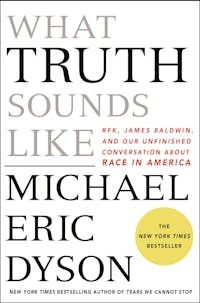What Truth Sounds Like
Robert F. Kennedy, James Baldwin, and Our Unfinished Conversation About Race in America
 Download image
Download image
ISBN10: 1250199417
ISBN13: 9781250199416
Hardcover
304 Pages
$24.99
CA$32.50
In 2015 BLM activist Julius Jones confronted Presidential candidate Hillary Clinton with an urgent query: “What in your heart has changed that’s going to change the direction of this country?” “I don’t believe you just change hearts,” she protested. “I believe you change laws.”
The fraught conflict between conscience and politics—between morality and power—in addressing race hardly began with Clinton. An electrifying and traumatic encounter in the sixties crystallized these furious disputes.
In 1963 Attorney General Robert Kennedy sought out James Baldwin to explain the rage that threatened to engulf black America. Baldwin brought along some friends, including playwright Lorraine Hansberry, psychologist Kenneth Clark, and a valiant activist, Jerome Smith. It was Smith’s relentless, unfiltered fury that set Kennedy on his heels, reducing him to sullen silence.
Kennedy walked away from the nearly three-hour meeting angry—that the black folk assembled didn’t understand politics, and that they weren’t as easy to talk to as Martin Luther King. But especially that they were more interested in witness than policy. But Kennedy’s anger quickly gave way to empathy, especially for Smith. “I guess if I were in his shoes . . . I might feel differently about this country.” Kennedy set about changing policy—the meeting having transformed his thinking in fundamental ways.
There was more: every big argument about race that persists to this day got a hearing in that room. Smith declaring that he’d never fight for his country given its racist tendencies, and Kennedy being appalled at such lack of patriotism, tracks the disdain for black dissent in our own time. His belief that black folk were ungrateful for the Kennedys’ efforts to make things better shows up in our day as the charge that black folk wallow in the politics of ingratitude and victimhood. The contributions of black queer folk to racial progress still cause a stir. BLM has been accused of harboring a covert queer agenda. The immigrant experience, like that of Kennedy—versus the racial experience of Baldwin—is a cudgel to excoriate black folk for lacking hustle and ingenuity. The questioning of whether folk who are interracially partnered can authentically communicate black interests persists. And we grapple still with the responsibility of black intellectuals and artists to bring about social change.
What Truth Sounds Like exists at the tense intersection of the conflict between politics and prophecy—of whether we embrace political resolution or moral redemption to fix our fractured racial landscape. The future of race and democracy hang in the balance.
Reviews
Praise for What Truth Sounds Like
“Passionately written . . . Dyson's larger purpose is to reflect on the relevance of the dynamic it represented—speaking truth to power—in the current racial and political climate. Singling out the cultural types represented in Baldwin’s delegation—artists, intellectuals and activists—Dyson devotes individual chapters to how examples of each bear witness to black struggle today. When it comes to artists (and athletes), Dyson invokes a sometimes dizzying array of pop-culture stars and phenomena, from Jay-Z and Beyoncé, to LeBron James and Colin Kaepernick, to “Hamilton” and “Black Panther.”—The Washington Post
"[An] exploration of persistent questions about race that appear today, starting with a 1963 meeting between Attorney General Robert Kennedy and black activists, including James Baldwin."—Texarkana Gazette
"Dyson’s much-recommended work puts forth the artists and activists who continue to celebrate blackness, offering a welcome reminder of the power of art to maintain dialog with and within America."—Library Journal
“Dyson delivers a piercing and wide-ranging analysis of American race relations . . . a poignant take on still-festering racial tensions in the United States.” —Publisher's Weekly
“[A]n incisive look at the roles of politicians, artists, intellectuals, and activists in confronting racial injustice and effecting change. An eloquent response to an urgent—and still-unresolved—dilemma.“ —Kirkus Reviews



